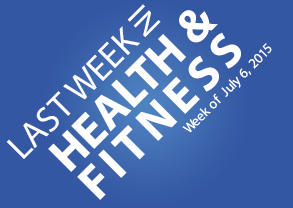 Hello again everyone! I hope everyone had an amazing fourth! Coach Jimmy here, I am back for another week of the top 5 health and fitness articles from across the internet. For anyone new here, I search the web for the best articles related to health and fitness so you don’t have to and can put your efforts towards reaching your own personal and professional goals.
Hello again everyone! I hope everyone had an amazing fourth! Coach Jimmy here, I am back for another week of the top 5 health and fitness articles from across the internet. For anyone new here, I search the web for the best articles related to health and fitness so you don’t have to and can put your efforts towards reaching your own personal and professional goals.
This week we cover the topics of if you can really gain muscle when you are sleeping, some facts you may not know about postpartum depression, what are phytonutrients, marathon training with INSANITY, and if running is bad for your body.
The Top Health & Fitness Articles from Last Week
Can You Really Gain Muscle While You Sleep?
“the results showed that ingesting additional protein before sleep helped with overnight muscle growth.”
 You probably already know by now that by getting a good night’s sleep, your body benefits greatly with improved memory, clearer thinking, reduced stress levels, along with being prepared to take on the day. A study by the University of Maastricht in the Netherlands showed that by taking additional protein supplements before bed, participants showed higher muscle growth than the individuals given the placebo. Although both groups were on high protein diets, this study proves a few things about protein supplements.
You probably already know by now that by getting a good night’s sleep, your body benefits greatly with improved memory, clearer thinking, reduced stress levels, along with being prepared to take on the day. A study by the University of Maastricht in the Netherlands showed that by taking additional protein supplements before bed, participants showed higher muscle growth than the individuals given the placebo. Although both groups were on high protein diets, this study proves a few things about protein supplements.
What You May Not Know About Postpartum Depression
“According to the American Psychological Association, as many as 16 percent of women experience postpartum depression, a more prolonged and severe illness.”
 Most people have heard of postpartum depression, but many are unsure on what it exactly is. Postpartum depression can strike at anytime within the first year after giving birth. Many of the symptoms are very similar to mild cases of “baby blues”. These can include high stress levels, mood swings, antisocial behavior, among others. This article discuss the differences, as well as explains why additional screenings are being implemented nationwide and hopefully will soon become the norm. This will help mothers around the nation get a better understanding of this disease and can receive the treatment they need. If you suspect you or someone may be experiencing postpartum depression, please consult your doctor.
Most people have heard of postpartum depression, but many are unsure on what it exactly is. Postpartum depression can strike at anytime within the first year after giving birth. Many of the symptoms are very similar to mild cases of “baby blues”. These can include high stress levels, mood swings, antisocial behavior, among others. This article discuss the differences, as well as explains why additional screenings are being implemented nationwide and hopefully will soon become the norm. This will help mothers around the nation get a better understanding of this disease and can receive the treatment they need. If you suspect you or someone may be experiencing postpartum depression, please consult your doctor.
What Are Phytonutrients?
“Generally speaking, phytonutrients have antioxidant and anti-inflammatory properties, and they may reduce cancer risks and promote liver health.”
 Many people have not even heard of Phytonutrients, let alone know what they are. Phytonutrients are essential nutrients needed by a plant for the overall health and defense of itself. They are found in all fruits and vegetables, and foods rich in them will have very deep or bright colors. Some examples are: blueberries, red cabbage, tomatoes, and kale. Not all foods that contain phytonutrients are brightly colored. Whole grains, seeds, herbs, nuts, and many different kinds of spices also contain Phytonutrients.
Many people have not even heard of Phytonutrients, let alone know what they are. Phytonutrients are essential nutrients needed by a plant for the overall health and defense of itself. They are found in all fruits and vegetables, and foods rich in them will have very deep or bright colors. Some examples are: blueberries, red cabbage, tomatoes, and kale. Not all foods that contain phytonutrients are brightly colored. Whole grains, seeds, herbs, nuts, and many different kinds of spices also contain Phytonutrients.
Fitspiration Friday: Ross Trained for Marathons with INSANITY!
“I had run between 5 to 10 marathons before starting INSANITY and have now run 22”
 Meet Ross. Ross is a marathon runner who met Fran P. during the 2010 Honolulu Marathon. She was there promoting different Beachbody programs and recommended INSANITY as an alternative to Ross’s normal marathon training. After some skepticism and remembering watching a commercial for it and thinking; “No way I could do that!”. Ross began training for the 2011 Tel Aviv Marathon. He lives in Chicago, where training in the winter can be extremely difficult. He decided to purchase INSANITY around Christmas and began his workout routine on New Year’s Day. When April and the Tel Aviv Marathon came, Ross had only ran about 6 or 7 times the entire year, but had trained almost exclusively with INSANITY. Ross beat his personal record by 20 minutes!
Meet Ross. Ross is a marathon runner who met Fran P. during the 2010 Honolulu Marathon. She was there promoting different Beachbody programs and recommended INSANITY as an alternative to Ross’s normal marathon training. After some skepticism and remembering watching a commercial for it and thinking; “No way I could do that!”. Ross began training for the 2011 Tel Aviv Marathon. He lives in Chicago, where training in the winter can be extremely difficult. He decided to purchase INSANITY around Christmas and began his workout routine on New Year’s Day. When April and the Tel Aviv Marathon came, Ross had only ran about 6 or 7 times the entire year, but had trained almost exclusively with INSANITY. Ross beat his personal record by 20 minutes!
Is Running Bad For You?
“During the years of the study, light joggers were 78% less likely to die than other participants.”
 Is running at a fast pace for four hours a day as healthy as sitting on the couch and watching Netflix? A Copenhagen City Heart Study looked at the death rates between 2001 and 2014 of more than 1,000 joggers and more than 400 healthy but sedentary non-joggers. Joggers were separated into grouped of light joggers and heavy joggers depending on their speed, intensity, and duration. During the study, light joggers were 78% less likely to die than all other groups in the study. This study seems to show pretty clearly that light joggers are more likely to live longer than heavy joggers or sedentary non-joggers, but the data doesn’t include the gender, age, overall health, and the reason for death. Studies like these are extremely helpful to the fitness community, but we need to be wary studies that don’t provide all the facts.
Is running at a fast pace for four hours a day as healthy as sitting on the couch and watching Netflix? A Copenhagen City Heart Study looked at the death rates between 2001 and 2014 of more than 1,000 joggers and more than 400 healthy but sedentary non-joggers. Joggers were separated into grouped of light joggers and heavy joggers depending on their speed, intensity, and duration. During the study, light joggers were 78% less likely to die than all other groups in the study. This study seems to show pretty clearly that light joggers are more likely to live longer than heavy joggers or sedentary non-joggers, but the data doesn’t include the gender, age, overall health, and the reason for death. Studies like these are extremely helpful to the fitness community, but we need to be wary studies that don’t provide all the facts.
